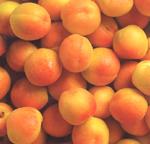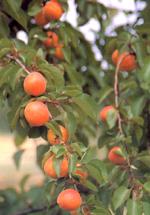| Fruits |
Vegetables
|
Apricot, Prunus armeniaca / Rosaceae
|
Note: Composition for 100 g. of fresh product Values in ( min. - max. ) format. | |
| Energy: 31.00-53.00 kcal Fats: 0.10-0.90 g Fibres: 1.54-1.70 g Minerals Calcium: 9.00-16.00 mgZinc: 0.100-0.139 mg Chlorine: 1.00-3.00 mg Phosporus: 15.00-21.00 mg Iron: 0.50-1.00 mg Magnesium: 9.20-11.00 mg Manganese: 0.100-0.167 mg Potasium: 270.00-278.00 mg Selenium: 1.30-1.30 µg Sodium: 2.00-2.00 mg Iodine: 0.500-0.500 µg | Proteins: 0.80-0.90 kcal Carbohidrates: 7.20-8.54 g Liposoluble Vitamins A Retinol: 0.00-264.58 µgA Carotenoids: 405.00-1610.00 µg E or Tocoferol: 0.500 mg Liposoluble Vitamins B1 or Thiamine: 0.038-0.040 mgB2 or Riboflavine: 0.050-0.095 mg B3 or Niacine: 0.500-0.50 mg B5 or Pantothenic Acid: 0.240-0.290 mg B6 or Piridoxine: 0.070-0.080 mg B9 or Folic Acid: 3.00-9.40 mg C or Ascorbic Acid: 3.00-9.40 mg |
|
Note: Composition for 100 g. of fresh product Values in ( min. - max. ) format. | |
| Energy: 63.00-75.22 kcal Fats: 0.10-0.10 g Fibres: 0.90-0.90 g Minerals Calcium: 11.00-19.00 mgZinc: 0.100-0.100 mg Chlorine: 2.00-2.00 mg Phosporus: 8.00-8.00 mg Iron: 0.200-0.700 mg Magnesium: 5.00-5.00 mg Potasium: 150.00-171.00 mg Selenium: 0.500-0.500 µg Sodium: 10.00-10.40 mg Iodine: 7.00-7.00 µg | Proteins: 0.40-0.50 kcal Carbohidrates: 16.10-18.08 g Liposoluble Vitamins A Retinol: 0.00-122.67 µgA Carotenoids: 155.00-736.00 µg K or Filoquinone: 5.00-5.00 µg Liposoluble Vitamins B1 or Thiamine: 0.010-0.020 mgB2 or Riboflavine: 0.010-0.020 mg B3 or Niacine: 0.30-0.30 mg B5 or Pantothenic Acid: 0.100-0.600 mg B6 or Piridoxine: 0.050-0.060 mg B9 or Folic Acid: 4.00-5.00 mg C or Ascorbic Acid: 4.00-5.00 mg |
|
Note: Composition for 100 g. of fresh product Values in ( min. - max. ) format. | |
| Energy: 188.00-239.53 kcal Fats: 0.50-0.90 g Fibres: 7.70-8.63 g Minerals Calcium: 53.00-92.00 mgZinc: 0.400-0.700 mg Chlorine: 5.40-35.00 mg Phosporus: 9.00-120.00 mg Iron: 4.10-5.80 mg Magnesium: 50.00-65.00 mg Manganese: 0.40-1.50 mg Potasium: 1370.00-1880.00 mg Selenium: 7.00-7.00 µg Sodium: 11.00-56.00 mg Iodine: 2.70-2.70 µg | Proteins: 4.80-5.40 kcal Carbohidrates: 41.50-47.87 g Liposoluble Vitamins A Retinol: 5790.00-5790.00 µgA Carotenoids: 34.89-2500.00 µg Liposoluble Vitamins B1 or Thiamine: 0.007-0.007 mgB2 or Riboflavine: 0.110-0.200 mg B3 or Niacine: 3.00-5.10 mg B5 or Pantothenic Acid: 0.700-0.830 mg B6 or Piridoxine: 0.170-0.170 mg B9 or Folic Acid: 11.00-12.00 mg C or Ascorbic Acid: 11.00-12.00 mg |

The apricot is a fruit that resembles the peach but much smaller, pale yellow or orange with some red shades. The pulp is not very juicy, it has fibre texture and farinaceous consistency when the apricot is mature. It is mainly consumed fresh, although it is also used to make some by-products like stewed fruit, jams, juices and dried apricots.
Nutrition and eating
Apricots have a high concentration of vitamin C. This vitamin prevents scurvy and protects against stomach cancer. They are also good for sight and the immunological system.
The fruit
 The apricot is a fruit that resembles the peach but much smaller, pale yellow or orange with some red shades. The pulp is not very juicy, it has fibre texture and farinaceous consistency when the apricot is mature. It is mainly consumed fresh, although it is also used to make some by-products like stewed fruit, jams, juices and dried apricots.
The apricot is a fruit that resembles the peach but much smaller, pale yellow or orange with some red shades. The pulp is not very juicy, it has fibre texture and farinaceous consistency when the apricot is mature. It is mainly consumed fresh, although it is also used to make some by-products like stewed fruit, jams, juices and dried apricots.The apricot belongs to the family of the Rosaceae and it usually has a spherical shape although it can also be flat, of about 3 cm of diameter. The apricot is very similar to the peach although it is smaller and paler.
The colour ranges from pale yellow to orange and many apricots show a smooth red shade in the zone where they have been exposed to the sun. The skin is downy, the pulp is not very juicy and it has a pleasant firm texture that tends to be somehow fibrous and farinaceous when the apricot is very mature.
The apricot has a seed with almond shape covered by a hard woody bark or endocarp, that is usually separated from the flesh. This almond or embryo has a bitter flavour and it is not edible; some varieties are even poisonous, due to their content of a substance called amygdalin, of which one of the most active poisons can be extracted: the cyanic acid.
Apricots must be consumed mature since only with a good exposition on the sun we can obtain delicious fruit. The best time to consume apricots in the N hemisphere is between July and September.
The apricot is consumed fresh as dessert fruit or it is used to process different by-products. When they are consumed fresh, it is recommended to wash them previously, so as to remove impurities and dirt.
Among the by-products we find jam, stewed apricots, juices, tinned apricots and the famous dried apricots. They are obtained from fresh apricots subject to processes of drying in rooms at 65-70ºC or under the sun after peeling them. This increases the time of preservation. As their water content decreases, there is an important concentration of nutrients; therefore, the nutritious value of dried apricots is higher than that of fresh apricots.
The plant

The apricot grows mainly in strong trees, with a well-developed crown, it bears droughts, but it is very sensitive to spring frosts. The apricot must be harvested completely mature, otherwise the pulp does not develop its sweet flavour and it is not edible.
The apricot, Prunus armeniaca, is the fruit of the apricot tree, that belongs to the family of the Rosaceae. They are 3-4 m high plants, with a strong trunk, wide crown, with many branches.
The flowers grow alone in each bud and they have a red calix and pink or white corolla. It is resistant to high temperatures and droughts; however, this tree is very sensitive to frosts, mainly those of spring, since they blossom early, towards mid March in the N Hemisphere.
The apricot has a sweet flesh, but only if it is well ripe; if this is not so, it tastes very acid, it is hard and not edi.ble, and very unpleasant for the consumer.
The apricot, Prunus armeniaca, is the fruit of the apricot tree, that belongs to the family of the Rosaceae. They are 3-4 m high plants, with a strong trunk, wide crown, with many branches.
The flowers grow alone in each bud and they have a red calix and pink or white corolla. It is resistant to high temperatures and droughts; however, this tree is very sensitive to frosts, mainly those of spring, since they blossom early, towards mid March in the N Hemisphere.
The apricot has a sweet flesh, but only if it is well ripe; if this is not so, it tastes very acid, it is hard and not edi.ble, and very unpleasant for the consumer.
| Interempresas Media, S.L. / 2025 | [ Legal notice | Política de Protección de Datos | Política de cookies | Publicidad] |
